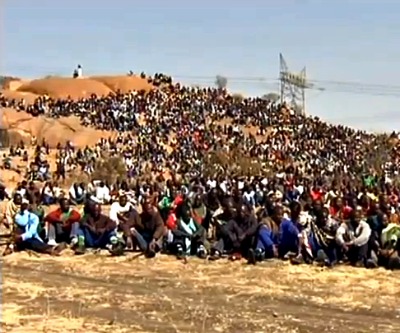Lonmin to miners: Rock up for work on Monday or you’re fired

A standoff between hundreds of striking rock-drill operators gathered on a hilltop wielding pangas and sticks at London-listed Lonmin’s Marikana mine in the NorthWest province of South Africa ended when police began firing on a surging crowds leaving 34 dead.
Lonmin had initially ordered miners to return to work by Friday and then changed the deadline to Monday adding in a statement that workers “could therefore be dismissed if they fail to heed the final ultimatum.”
THe RDOs are asking for the minimum wage to be increased from R4,000 (just under $500) to R12,500 ($1,540).
The Mail & Guardian spoke to one striking worker who ruled out the chance of a return to work:
“Expecting us to go back is like an insult. Many of our friends and colleagues are dead, then they expect us to resume work. Never,” said worker Zachariah Mbewu, adding that no one would return to work as long as they were still in mourning.
“Some are in prison and hospitals. Tomorrow we are going back to the mountain [protest site], not underground, unless management gives us what we want.”
AP reports in 2011 after a “similar dispute over labor representation stopped work at its nearby Karee mine, Lonmin fired all 9,000 workers. Then it asked them to reapply for their jobs and most were rehired.”
The 3,000 striking miners are represented by the Association of Mineworkers and Construction Union (Amcu), which is attempting to raise its profile as an alternative to the National Union of Mineworkers (NUM), the country’s largest mining union.
On Friday, Amcu said it has roughly 30,000 members nationally and is the recognised union at Lonmin’s SA operations with 7,000 members.
South African columnist Justice Malala writing in the UK’s Guardian provides insights on how the situation developed into “a strike by the poor against the state and the haves”:
Under the leadership of Cyril Ramaphosa – ironically now on the board of Lonmin, which owns the mine where the shootings occurred – the union [NUM] became the biggest affiliate to the Congress of South African Trade Unions (Cosatu), a powerful ally of the ANC.
[…]
The NUM has lost all credibility and is bleeding members. Its already well-paid secretary, Baleni, was awarded a salary increase of more than 40% last year and his total salary package is just more than R105 000 [$13,000] a month. NUM leaders have refused to get out of police armoured vehicles to address workers. Last year one of them was struck with a brick and lost an eye. They have no cogent plan to end the strike.
The police, too, have lost credibility. Although the indications are that they were shot at, a death count of 34 in three minutes suggests panic, ill-preparedness and fear.
Lonmin said in an announcement on Thursday that its CEO, Ian Farmer, has been hospitalized after “being diagnosed with a serious illness”.
The violence started last weekend – another 10 people including police, guards and workers had died before Thursday’s shootings – and Lonmin has now lost a week’s worth of production which translates into more than 15,000 platinum ounces.
The Marikana complex has a total workforce of 28,000 and accounts for some 12% of global platinum output.
Spot platinum prices jumped by more than $44 an ounce on Thursday as the news about the killings broke and the precious metal settled at $1,472 on Friday, up another $36.
The metal, mainly used in catalytic converters for vehicles, is still down more than 20% compared to this time last year. South Africa accounts for 80% of global platinum production.
More News
Contract worker dies at Rio Tinto mine in Guinea
Last August, a contract worker died in an incident at the same mine.
February 15, 2026 | 09:20 am
{{ commodity.name }}
{{ post.title }}
{{ post.date }}




Comments